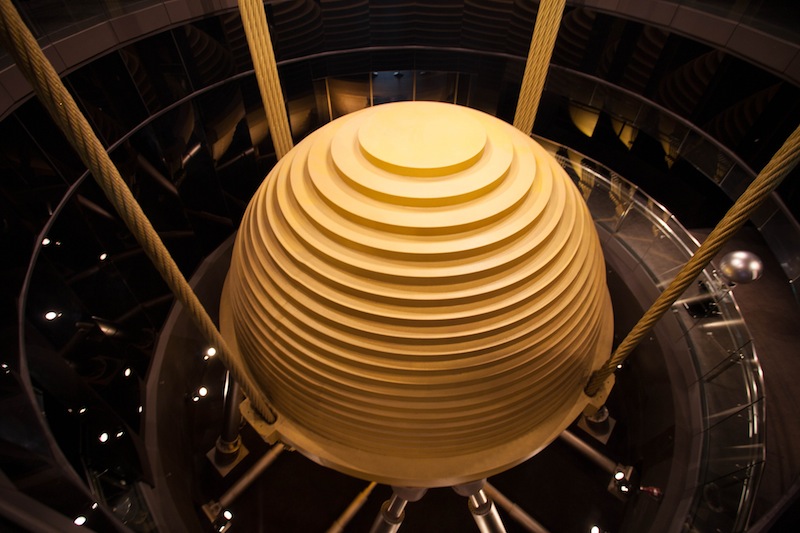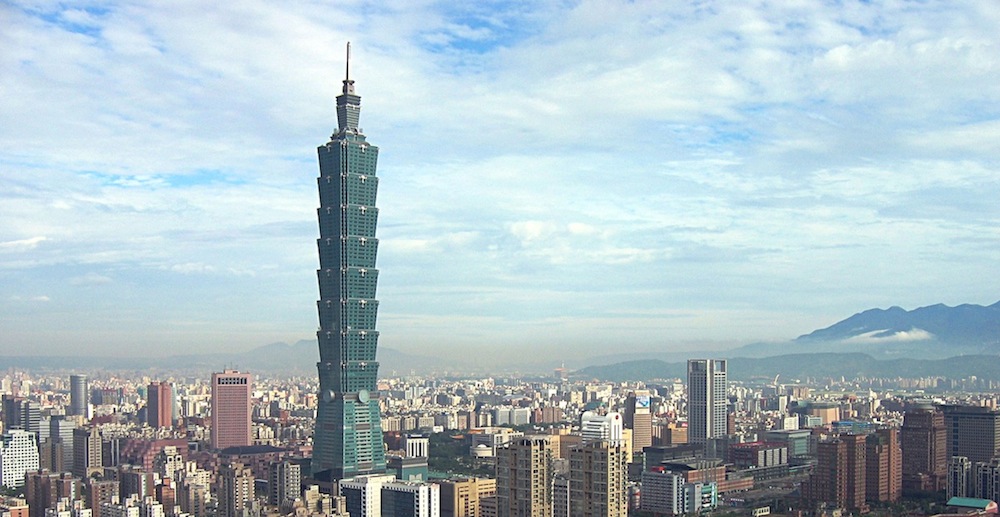The Taipei 101 tower in Taiwan has no problem welcoming possible danger. It can handle it.
The 1,667-foot building, once the tallest in the world, is ranked first on the list of the world’s 10 toughest buildings, as determined by Popular Mechanics. The publication worked with field specialists from Yale, SHoP Architects, and the Resilient Design Institute to form the list.
Taipei 101 stands only 660 feet from a major fault line in a typhoon-prone location. To balance out high winds and earth vibrations, the structure has a 730-ton, 18-foot wide weighted spherical damper supported by hydraulic cylinders near the top of the skyscraper. As proof of its toughness, the building withstood a storm in August that saw 100 to 145 mph winds.
Other entries on the list include One World Trade Center in New York, which stands on a 185-foot-tall concrete base, and the Public Safety Building in Salt Lake City, which contains seismic dampers to help it remain operational even after 7.5 magnitude earthquakes.
 The 18-foot damper ball at the top of Taipei 101. Photo: Ray Terrill/Creative Commons
The 18-foot damper ball at the top of Taipei 101. Photo: Ray Terrill/Creative Commons
Related Stories
| Aug 11, 2010
Theater Renovation—A First-Class Production
In 1985, the city of San Diego ordered the historic Balboa Theatre, its beleaguered performing arts center, to be shuttered due to seismic safety concerns. It would take another two decades to restore the landmark building.
| Aug 11, 2010
American Concrete Institute forms technical committee on BIM for concrete structures
The American Concrete Institute (ACI) announces the formation of a new technical committee on Building Information Modeling (BIM) of Concrete Structures.
| Aug 11, 2010
World-Class Revival on Utah’s Capitol Hill
Since 1916, the Utah State Capitol building has served as the foundation of Utah’s government, housing the state legislature operations as well as the offices of the governor, attorney general, and treasurer. But after decades of wear and tear and numerous short-sighted modernization attempts, Utah’s rock was on the verge of crumbling.
| Aug 11, 2010
Earthquake engineering keeps airport grounded
Istanbul, Turkey's new 2.15 million-sf Sabiha Gökçen International Airport opened on October 31, 2009, becoming the world's largest seismically isolated building. Arup's global airport planning and engineering team, in collaboration with architects Dogan Tekeli Sami Sisa Mimarlik Ofisi and contractor LIMAK-GMR JV, working within an 18-month timeline, designed and built the facility wi...
| Aug 11, 2010
Pioneer Courthouse: Shaking up the court
In the days when three-quarters of America was a wild, lawless no-man's land, Pioneer Courthouse in Portland, Ore., stood out as a symbol of justice and national unity. The oldest surviving federal structure in the Pacific Northwest and the second-oldest courthouse west of the Mississippi, Pioneer Courthouse was designed in 1875 by Alfred Mullett, the Supervising Architect of the Treasury.
| Aug 11, 2010
AIA Course: Historic Masonry — Restoration and Renovation
Historic restoration and preservation efforts are accelerating throughout the U.S., thanks in part to available tax credits, awards programs, and green building trends. While these projects entail many different building components and systems, façade restoration—as the public face of these older structures—is a key focus. Earn 1.0 AIA learning unit by taking this free course from Building Design+Construction.







